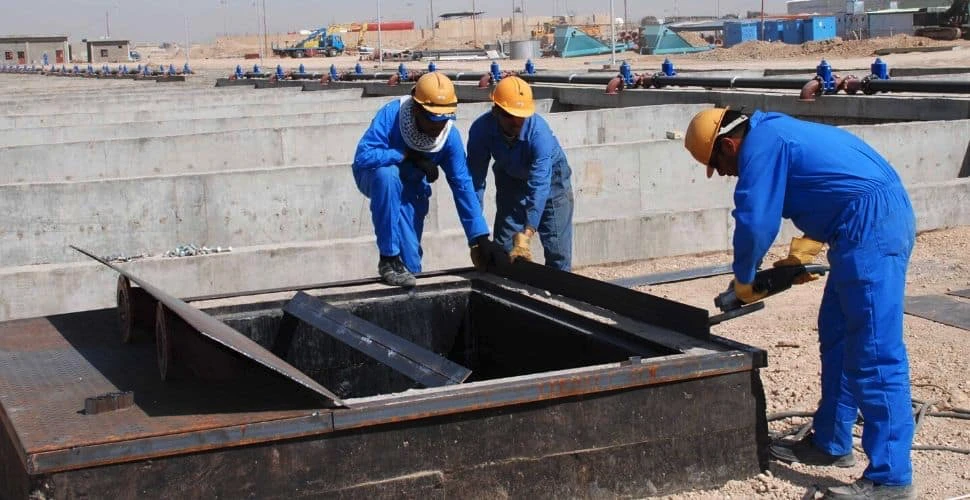In just over 100 days, the World Cup kicks off in Qatar. The tournament has been marred by a constant stream of forced labor allegations and the exploitation of Qatar’s two million migrant workers. Tasked with building the vast infrastructure and working in hotels and hospitality required to bring the world one of the biggest sporting events, this low-paid workforce is key to ensuring that the World Cup in Qatar is a glittering operation for the estimated one million visitors.
Meanwhile, these workers are paid low wages, housed in cramped and dirty living conditions, prevented from leaving exploitative work situations and remain effectively tied to their employers despite legislative reforms made to the kafala system by the Qatari government.
Significant reforms require effective implementation
In the past four years, the Qatari government and the International Labour Organization have collaborated on a series of reforms to the notorious kafala sponsorship system that governs migrant workers’ relationships with employers in the country, tying migrant workers’ immigration status to their employer. Under this sponsorship system, which is present in many other countries, migrant workers are unable to change jobs or leave the country without their employer’s permission, leaving workers vulnerable to exploitation and becoming trapped in forced labor with no way out.
In 2020, the Emir of Qatar abolished restrictions on migrant workers changing jobs without their employer’s permission and introduced a monthly minimum wage of 1,000 Qatari riyal, in addition to giving basic living allowances for some workers. Previously, migrant workers required a ‘No Objection Certificate’ from their employer to demonstrate they had their employers’ permission to change jobs. Furthermore, a Wage Protection System was announced to ensure migrant workers’ are receiving their wages from employers.
Hailed as “ambitious and comprehensive” these reforms signaled the beginning of potentially transformative legislation governing low-paid migrant workers in the country. However, a lack of enforcement and effective implementation of reforms continues to present barriers to low-paid migrant workers exercising their rights and seeking remedy for abuses committed against them.
“They’ve only abolished the kafala system on paper. It’s the same if not harder to change jobs”[3] says Malcolm Bidali, an activist and blogger on migrant rights who worked under exploitative conditions in Qatar as a security guard.
Exploitation in Qatar’s hotels
A recent report documenting the conditions migrant workers are subjected to in the hotel industry in Qatar exposes how workers are systematically blocked from exercising their rights through being “denied the fundamental right to associate, subjected to intensive surveillance and employer control, and fear retaliation-including employer-instigated deportation.”
Research shows that payment of recruitment fees by migrant workers who predominantly travel from South Asia, South East Asia, and East Africa to work in Qatar is one of the key drivers of exploitation. Though prohibited under Qatari law, migrant workers pay these high recruitment fees – often amounting to one year’s salary – which can be to hotels’ business partners and recruitment, or informal arrangements with friends and families.
Companies that fail to cover these costs put workers in precarious situations where they are vulnerable to exploitation, unable to leave their jobs, and “in the worst cases they have been driven to suicide under the pressure of debt and low wages.”
One migrant worker who had worked in Qatar for five years explained “Change came on paper but [not] on the ground … When you go inside the company and among the workers [you see that] only a very small change has happened. It is still appalling.”
FIFA must take accountability
As the world’s football governing body that stands to make billions of dollars from this tournament, FIFA has an important role to play in compensating workers for the conditions they have been forced to endure.
Human rights groups are calling on FIFA to set aside at least $440 million for the hundreds of thousands of migrant workers who have suffered human rights abuses over the course of the past twelve years in preparation for the World Cup. But this would still just be the bare minimum to compensate workers and their families.
A larger part of the expected $6 billion that FIFA is projected to rake in from the World Cup should be distributed to workers to “[reimburse] unpaid wages, the extortionate recruitment fees […] and compensation for injuries and deaths.”
Under the UN Guiding Principles on Business and Human Rights, FIFA has a responsibility to respect human rights and seek to mitigate and remedy rights abuses irrespective of Qatar’s ability to stringently implement reforms to the kafala system and hold exploitative employers accountable.
An April 2020 UN report from the Special Rapporteur on contemporary forms of racism states that Qatar operates a “de facto caste system based on national origin, which results in structural discrimination against non-citizens, including as the result of immense power imbalances between employers and migrant workers rooted in the kafala (sponsorship) system that historically structured labour relations in Qatar.”
Though the Qatari government has taken action to pass a host of reforms in 2020, the reality is that significant barriers remain for migrant workers to leave exploitative work relationships. Some workers are unaware of the recent reforms while others are unsure of their rights under Qatari law. In practice, migrant workers continue to report being threatened with deportation from employers if they want to leave their job with little being done to hold employers accountable.
The World Cup presents an opportunity for the Qatari government to implement critical reforms to protect migrant workers from exploitation and forced labor, and improve the working conditions of hundreds of thousands of migrant workers in Qatar.
When the tournament is over and fewer eyes are on Qatar, we must maintain the pressure on Qatar to demand justice for migrant workers. Sign the petition today.







-
Follow us on Facebook
5.6M
-
Follow us on Twitter
32K
-
Follow us on Instagram
8K
-
Subscribe to our Youtube
5.7K
Donate